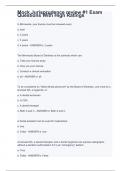MN Jurisprudence Green light Study guides, Class notes & Summaries
Looking for the best study guides, study notes and summaries about MN Jurisprudence Green light? On this page you'll find 6 study documents about MN Jurisprudence Green light.
All 6 results
Sort by
Colorado Exam Bundle With Complete Solutions
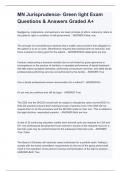
-
MN Jurisprudence- Green light Exam Questions & Answers Graded A+
- Exam (elaborations) • 11 pages • 2024
-
- $10.99
- + learn more
Negligence, malpractice, and autonomy are basic principle of ethics. Autonomy refers to the patient's right or condition of self-government. - ANSWER-False; true The principle of nonmaleficence declares that a health care provider's first obligation to the patient is to do no harm. Beneficence requires that existing harm be removed, and focus is placed on doing good for the patient. - ANSWER-Both statements are true Conduct unbecoming a licensee includes (but is not limited to) gross ign...
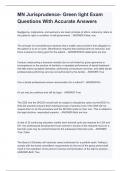
-
MN Jurisprudence- Green light Exam Questions With Accurate Answers
- Exam (elaborations) • 11 pages • 2024
-
- $10.49
- + learn more
Negligence, malpractice, and autonomy are basic principle of ethics. Autonomy refers to the patient's right or condition of self-government. - ANSWER-False; true The principle of nonmaleficence declares that a health care provider's first obligation to the patient is to do no harm. Beneficence requires that existing harm be removed, and focus is placed on doing good for the patient. - ANSWER-Both statements are true Conduct unbecoming a licensee includes (but is not limited to) gross ign...
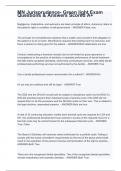
-
MN Jurisprudence- Green light Exam Questions & Answers Scored A+
- Exam (elaborations) • 11 pages • 2024
- Available in package deal
-
- $10.49
- + learn more
Negligence, malpractice, and autonomy are basic principle of ethics. Autonomy refers to the patient's right or condition of self-government. - ANSWER-False; true The principle of nonmaleficence declares that a health care provider's first obligation to the patient is to do no harm. Beneficence requires that existing harm be removed, and focus is placed on doing good for the patient. - ANSWER-Both statements are true Conduct unbecoming a licensee includes (but is not limited to) gross ign...
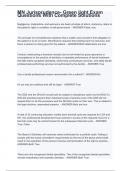
-
MN Jurisprudence- Green light Exam Questions With Complete Solutions
- Exam (elaborations) • 11 pages • 2024
- Available in package deal
-
- $10.99
- + learn more
Negligence, malpractice, and autonomy are basic principle of ethics. Autonomy refers to the patient's right or condition of self-government. - ANSWER-False; true The principle of nonmaleficence declares that a health care provider's first obligation to the patient is to do no harm. Beneficence requires that existing harm be removed, and focus is placed on doing good for the patient. - ANSWER-Both statements are true Conduct unbecoming a licensee includes (but is not limited to) gross ign...
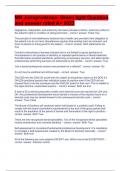
-
MN Jurisprudence- Green light Question and answer rated A+ 2023
- Exam (elaborations) • 9 pages • 2023
- Available in package deal
-
- $12.49
- + learn more
MN Jurisprudence- Green light Question and answer rated A+ 2023Negligence, malpractice, and autonomy are basic principle of ethics. Autonomy refers to the patient's right or condition of self-government. False; true The principle of nonmaleficence declares that a health care provider's first obligation to the patient is to do no harm. Beneficence requires that existing harm be removed, and focus is placed on doing good for the patient. Both statements are true Conduct unbecomin...

